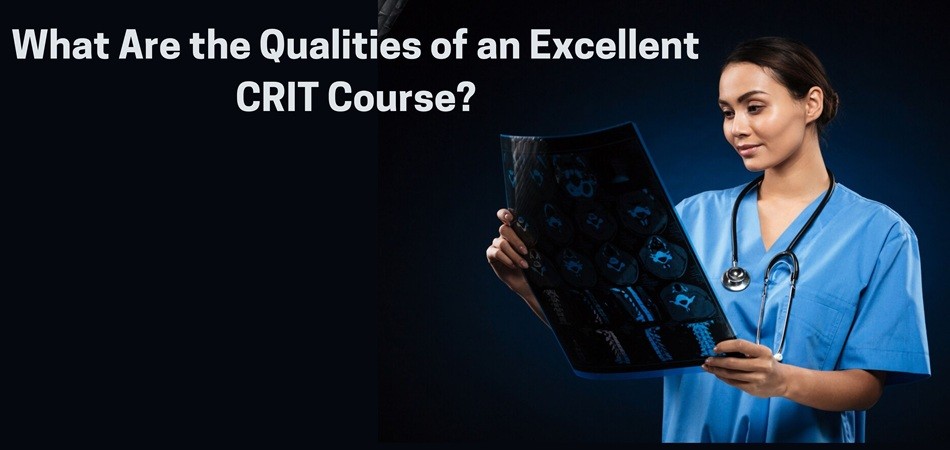What Are the Qualities of an Excellent CRIT Course?

Radiology and Imaging Technology is a dynamic field that combines advanced medical imaging techniques with patient care by making it an essential component of modern healthcare.
Choosing the right certificate course in this domain can significantly impact your career trajectory. An excellent course should equip you with technical skills while fostering critical thinking, professionalism, and adaptability. Below are the key qualities that define CRIT courses:
1. Accreditation and Credibility
- Accreditation: A quality program is accredited by recognized bodies such as the UGC Accreditation ensures the curriculum meets national standards and prepares students for safe and effective practice.
- Certification Opportunities: Graduates should be eligible to sit for national or regional certification exams, such as those conducted by Indian institutions ensuring they are recognized professionals in the field.
2. Comprehensive Curriculum
A robust CRIT course information is essential for developing expertise in radiology and imaging technology. Key components include:
- Medical Imaging Techniques: Training in X-rays, MRIs, CT scans, sonography, and advanced imaging methods like functional MRI (fMRI).
- Anatomy and Physiology: Detailed study of human anatomy to understand the structural complexities of the body.
- Radiation Safety: Emphasis on radiation protection measures to ensure patient safety.
- Patient Care: Courses focusing on compassionate care, communication skills, and ethical practices.
3. Hands-On Clinical Training
Practical experience is a cornerstone of radiology education:
- Simulated Environments: Programs should offer simulated training with state-of-the-art equipment to build confidence before clinical placements.
- Clinical Internships: Opportunities to work in hospitals, outpatient centres, or diagnostic labs under professional supervision are crucial for real-world exposure.
4. Technical Skills Development
An excellent CRIT course equips students with advanced technical skills:
- Radiographic Techniques: Training in exposure factors, positioning, and image quality assessment.
- Equipment Operation: Proficiency in handling sophisticated imaging equipment like CT scanners and mobile units.
- Problem-Solving Skills: Students should learn to adapt procedures based on patient conditions and diagnostic needs.
5. Career Advancement Opportunities
Graduates should be prepared for diverse roles:
- Specialization Options: Programs offering pathways to specialize in areas like MRI, ultrasound, nuclear medicine, or interventional radiography are highly valuable.
- Professional Growth: Courses should emphasize ethical practices, continuing education, and leadership skills for long-term career success.
6. Supportive Learning Environment
A supportive program fosters student success through:
- Small Class Sizes: Personalized attention enhances learning outcomes.
- Tutoring Services: Accessible academic support ensures students excel in challenging subjects.
- Experienced Faculty: Instructors with industry expertise provide invaluable mentorship.
Certified CRIT Course Under Your Budget!
Choosing a high-quality certificate program in Radiology and Imaging Technology is an investment in your future as a healthcare professional. Look for programs that balance technical expertise, and CRIT college in Delhi /NCR with patient-centered approaches while offering ample opportunities for hands-on learning and specialization.
Frequently Asked Questions (FAQ’s)
1. What qualifications do I need to enrol in a certificate program?
Most programs require a high school diploma or equivalent with coursework in science subjects like biology and physics. Some may also require prior healthcare experience or entrance exams.
2. How long does it take to complete a certificate course?
Certificate programs typically range from 1–2 years depending on the institution and curriculum design.
3. Are online courses available for radiology certification?
Yes, many institutions offer hybrid programs combining online theoretical components with on-site clinical training.
4. What career opportunities are available after completing the course?
Graduates can work as radiologic technologists in hospitals, outpatient centres, diagnostic labs, or specialize further in areas like MRI or ultrasound technology.
5. Is certification mandatory to work as a radiologic technologist?
Yes, certification is often required by regulatory bodies to ensure professional competency and patient safety standards are met.

